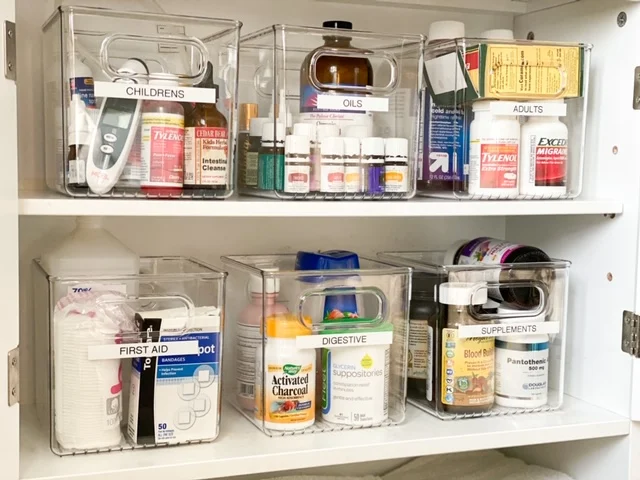Health
How to Properly Store Medications at Home?

Storing medications correctly at home is crucial for ensuring their potency and safety. Whether you’re managing a chronic condition, have occasional prescriptions, or keep over-the-counter medications on hand, the way you store them can impact their effectiveness.
We will explore the best practices for properly storing medications at home to help you maintain their integrity and safeguard your health.
Section 1: Location Matters
One of the first considerations when it comes to storing medications is where you keep them. Here’s why location matters:
- Cool and Dry: Store medications in a cool, dry place. Bathrooms, despite their convenience, are not ideal because they can be humid due to showers and baths. Moisture can degrade medications, making them less effective.
- Out of Reach: Keep medications out of the reach of children and pets. Children are naturally curious, and even a child-proof cap may not be a sufficient deterrent.
- Avoid Sunlight: Exposure to direct sunlight can break down some medications. Therefore, choose a storage location away from windows or other sources of sunlight.
Section 2: Temperature Control
Temperature control is essential to maintaining the effectiveness of your medications:
- Room Temperature: Most medications are best stored at room temperature (between 68°F and 77°F or 20°C and 25°C). Extreme temperatures, whether hot or cold, can alter the chemical composition of drugs.
- Refrigeration: Some medications, like certain antibiotics or insulin, need to be refrigerated. Check the label or consult your pharmacist for specific storage instructions.
- Avoid Freezing: Never freeze medications, as this can cause them to break down and become ineffective.
Section 3: Keep Original Packaging
Preserving the original packaging of your medications is a good practice:
- Information: The packaging contains important information, including dosage instructions, expiration dates, and potential side effects. Keeping the packaging helps ensure you have access to this information when needed.
- Child Safety: Many medications are packaged with child-resistant caps, an added layer of safety when storing them at home.
- Identity: It’s easy to confuse medications when they’re out of their original packaging. Keeping them in their original containers prevents mix-ups.
Section 4: Medication Expiration Dates
Pay close attention to medication expiration dates:
- Discard Expired Medications: Expired medications may lose their potency or even become harmful. Always dispose of them properly; do not use them.
- First In, First Out (FIFO): Arrange your medications so that the oldest ones are in front, making it more likely you’ll use them before newer ones.
Section 5: Secure Medications
Keeping medications secure is essential for safety:
- Lock Cabinets: Consider using a lockable medicine cabinet or storage container to prevent unauthorized access.
- Child-Proof Containers: If your medications don’t come with child-resistant caps, ask your pharmacist for them.
- Label Medications: Label your medications clearly if you have multiple people in your household taking similar-looking pills. Include the name of the medication, dosage, and any specific instructions.
A dental pharmacy is a convenient resource for patients, providing essential oral care products and medications prescribed by dentists. It ensures easy access to dental health necessities, promoting consistent oral hygiene and treatment adherence.
Section 6: Medication Disposal
Properly disposing of medications is just as important as storing them correctly:
- Do Not Flush: Avoid flushing medications down the toilet or drain. This can contaminate water sources.
- Medication Take-Back Programs: Check if your local pharmacy or community offers medication take-back programs for safe disposal.
- Dispose in Household Trash: If no take-back program is available, mix the medication with an undesirable substance (like used coffee grounds or kitty litter) and place it in a sealed container before disposing of it in the trash.
Conclusion:
Properly storing medications at home is a crucial aspect of maintaining your health and safety. By considering factors like location, temperature control, original packaging, medication expiration dates, security, and disposal, you can ensure that your medications remain effective and pose no harm to you, your family, or the environment. Always consult with your pharmacist in Newport provider if you have specific questions or concerns about storing a particular medication. Taking these precautions will help you manage your health with confidence and peace of mind.
-
Blog1 year ago
MyCSULB: Login to CSULB Student and Employee Portal – MyCSULB 2023
-
Android App3 years ago
Cqatest App What is It
-
Android1 year ago
What Is content://com.android.browser.home/ All About in 2023? Set Up content com android browser home
-
Software2 years ago
A Guide For Better Cybersecurity & Data Protection For Your Devices
-
Latest News2 years ago
Soap2day Similar Sites And Alternatives To Watch Free Movies
-
Android2 years ago
What is OMACP And How To Remove It? Easy Guide OMACP 2022
-
Android3 years ago
What is org.codeaurora.snapcam?
-
Business2 years ago
Know Your Business (KYB) Process – Critical Component For Partnerships





















